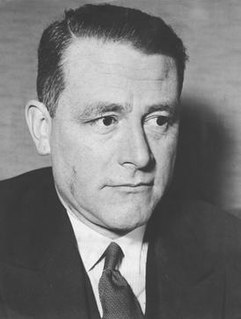A Quote by Karl Barth
Related Quotes
Oh my God, does art engender humanity? It awakens your humanity. But humanity has nothing to do with political theory. Political theory is in the interests of one group of humanity, or one ideal for humanity. But humanity-my heavens, that's what proper art renders. We have a paradox. Going into the deepest aspects of inner space connects you with something that is the most vital for the outer realm.
The concept of humanity is an especially useful ideological instrument of imperialist expansion, and in its ethical-humanitarian form it is a specific vehicle of economic imperialism. Here one is reminded of a somewhat modified expression of Proudhon’s: whoever invokes humanity wants to cheat. To confiscate the word humanity, to invoke and monopolize such a term probably has certain incalculable effects, such as denying the enemy the quality of being human and declaring him to be an outlaw of humanity; and a war can thereby be driven to the most extreme inhumanity.
The notion of "humanity" as a form of transcendence derives, I think, from the conviction that intellectuality possesses an absolute power, from the demand that our best behavior depends on our ability to think abstractly, in terms of a universal rule, about something called humanity, that we need to understand humanity abstractly so that we can act responsibly towards those who represent it.
In Dardenne brothers' films is a really small kind of humanity. It's not like the titanic "humanity" of humanism, it's much more gritty and realistic. But again, humanity is what unites all the people I'm talking about, and in such different ways. The humanity is in that moment you glimpse someone and have a completely intimate moment with them, and that intimacy is connected to an extreme pathetic aspect.
Humanity looks upon Jesus the Nazarene as a poor-born Who suffered misery and humiliation with all of the weak. And He is pitied, for Humanity believes He was crucified painfully. . . . And all that Humanity offers to Him is crying and wailing and lamentation. For centuries Humanity has been worshiping weakness in the person of the Savior. The Nazarene was not weak! He was strong and is strong! But the people refuse to heed the true meaning of strength.





































